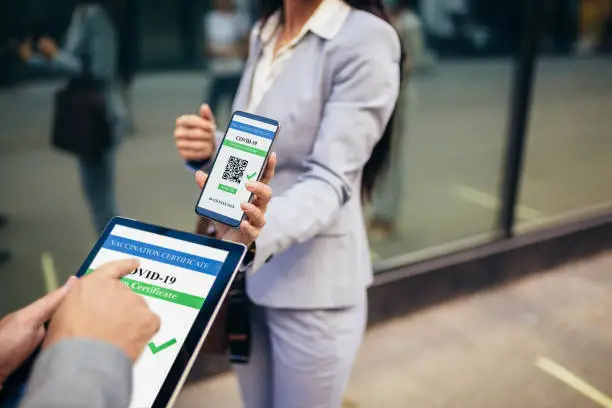COVID-19 was a big challenge for all businesses except for those corporations that opted for innovative digital solutions. AI-driven digital services were available before the lockdown, but enterprises did not opt for them as quickly. To contain the spread of the virus, the tourism industry started demanding COVID verification certificate to comply with international standards. Hotels, malls, and airports shifted to innovative methods to deal with global emergencies. The following blog discusses how the hospitality industry practised safe tourist onboarding by offering digital check-ins and demanding covid verification certificate to contain the spread of virus.
Understanding the Significance of COVID Verification Certificate
Verification of tourists was important to ensure COVID-free status and limit the spread of coronavirus. This was especially advantageous for authenticating tourists that were participating in large-scale events & public spaces having a large audience. The hospitality sector demanded and verified covid verification certificate, according to the requirements.
Using Touchless Check-Ins to ensure Unbeatable Safety
During the pandemic, checking into hotels was a major concern for the hospitality sector. Using innovative digital solutions, tourists could validate their identities and provide covid certificate verification to forgo manual procedures. The main objective was to prevent fraud and limit the spread of virus as well. This way, hotel service providers could stick to global health safety guidelines but also ensure a positive experience for the guests.
Offering Remote Onboarding
Hotel booking sites allowed customers to check in through smartphones before the actual visit. It did not matter if tourists were near destinations or guests were about to leave. Passengers were able to communicate with the hotel 24/7. The hotel staff could obtain details about the clients ahead of time, ensuring a positive experience. Information given during remote check-in could be validated once the visitor came on-site.
Providing Secure Channel
Passengers checking into hotels meant that they could submit their important credentials, such as full name & credit card details. If hotel service providers did not ensure data safety, it could take a toll not only on the passenger’s credit but also on the brand’s credibility. In this light, hotels used the latest self-check-in solutions that had end-to-end encryption to ensure data protection. Such tools were integrated with the hotel management system to ensure real-time sharing of customer details through secure communication channels.
Extending Touchless Kiosks
Several hotel service providers installed self-check-in kiosks that ensured automated and secure registration of guests. That being said, such devices did not need manual intervention to validate tourists to ensure compliance with social distancing norms. Besides the simplification of the onboarding procedure, touchless kiosks could scan credit cards.
Executing Identity Authentication Services
The digital hotel bookings were safe and convenient to facilitate transactions for a safe tour. In this light, hotel owners invested massive capital in streamlining tourist onboarding procedures and making them more reliable. With Artificial Intelligence (AI) models, fraudsters could not bypass the security protocols with a fake COVID verification certificate or passport. The contact-free kiosks at the hotels also had facial recognition technology to verify Covid certificate in real-time. The software also cross-checked the information provided during the digital check-in.
Performing Tourist Identification
Hotels could use COVID verification certificate to identify and validate the credentials of passengers. The touchless kiosks allowed visitors to enjoy a seamless onboarding experience while ensuring compliance with SOPs. AI-driven facial recognition technology cross-matched visitors’ credentials to discourage bad actors from exploiting the system. The liveness detection feature ensured that travelers did not submit fake images of faces to fool the security system. This allowed travel professionals and hotel staff members to discourage fraud attempts by cybercriminals in real-time.
Final Thoughts
The hospitality sector faced several COVID restrictions to authenticating tourist identities during the onboarding process. The requirements included verification of a Polymerase Chain Reaction (PCR) test and COVID verification certificate to limit spread of virus. The hotel service providers offered remote solutions to validate visitors ahead of time and ensure positive experiences for all passengers. COVID verification certificate allowed travel authorities, hotels, and travellers in public spaces to cross borders safely by using government-issued records. The documentation included passports & travel IDs for a positive & secure tourist experience.


